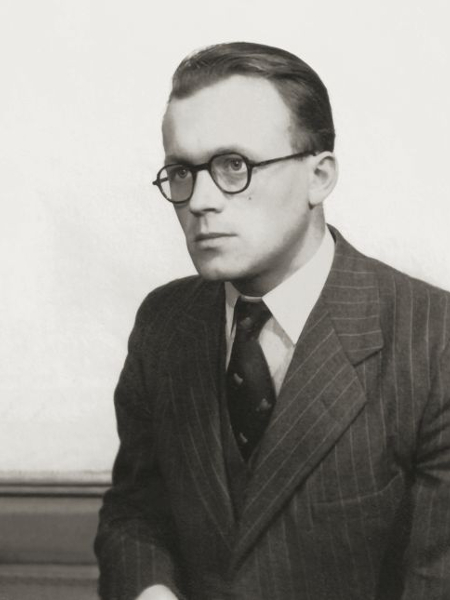Jonge, de, Hendrik Geert
- Date of birth:
- December 28th, 1916 (Doorwerth, the Netherlands)
- Date of death:
- December 12th, 2010 (Capelle aan den IJssel, the Netherlands)
- Nationality:
- Dutch
Biography
Hendrik (Henk) Geert de Jonge attended officer training at the KMA and was commissioned as a 2nd Lieutenant in the Coastal Artillery in 1938. After his demobilization in 1940 he decided to study law, but his aversion to Nazism was so great that in 1942 he decided to escape to England to work for the good cause. In this, and also later, he was guided by a strong faith in God. In 1943, via France, Spain, Portugal, Curaçao and New York, he reached England in November of that year, where he was trained as a secret agent. On March 12, 1943, he was dropped over Drenthe under the code name “Albrecht” with the assignment of setting up a spy network.
Until he was arrested in September 1943 in the Pyrenees while attempting to bring microfilms to England, he succeeded in laying the foundation for the most successful-and best organized-Dutch spy network of World War II. After all, this “Albrecht Hollands Glorie” group consisted of more than 800 collaborators. Together with his successor Jo van Arkel, who was also arrested, he appears before a German court and both are sentenced to death. However, the sentences were not carried out and both ended up in German prisons and concentration camps, which they narrowly survived.
After the war, De Jonge was awarded the Military Order of William and emigrated to Australia with his wife Ina, whom he had met shortly before the war. They later returned to the Netherlands where he died in 2010.
Do you have more information about this person? Inform us!
- Period:
- Second World War (1939-1945)
- Rank:
- Tijdelijk Kapitein van het wapen der Artillerie.
- Unit:
- Secret Intelligence Service (SIS), Directorate of Military Intelligence (DMI), Imperial General Staff, War Office, British Government
- Awarded on:
- August 30th, 1948
For having distinguished himself in combat by performing eminent deeds of courage, tact and loyalty such as:
after having established a very good organization after he had been dropped over the Netherlands on March 12, 1943, as organizer/agent with orders to expand military reporting and communicating this with the National Committee for military intelligence; his leadership and inspiring example enabled this organization to forward important military information to the Allies, especially in the last year of the war;
furthermore after having set up this intelligence group with energy and tact, having tried to report personally in England in order to set up other groups in an equal manner and to this end, in an equally energetic and extremely audacious manner in the company of six other Dutchmen, to capture an armed enemy S-boat in Scheveningen harbor in order to cross over to England; in this he failed because the engines would not start.
Finally for having tried to reach England through France and Spain and after having been interned in various prisons and concentration camps in Germany being liberated in 1945.
Royal Decree no. 8
- Period:
- Second World War (1939-1945)
- Rank:
- 1e Luitenant (Lieutenant)
- Awarded on:
- February 25th, 1943
Royal Decree no. 11
- Period:
- Second World War (1939-1945)
- Period:
- Second World War (1939-1945)
- Rank:
- Kapitein (Captain)
- Unit:
- Secret Intelligence Service (SIS), Directorate of Military Intelligence (DMI), Imperial General Staff, War Office, British Government
- Awarded on:
- May 24th, 1946
Dutch permission to accept and wear by Royal Decree dated 7 August, 1946.
Sources
- Photo 1: Stichting Liniecrossers Sliedrecht
- - SIMONS, J., Liniecrossers, Omniboek, 2021.
- Notice of passing away
- Spion voor de Heer | Trouw






